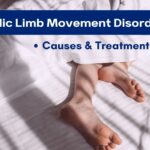In a world that seems to be always on the move, where deadlines loom large and schedules overflow, it’s easy to overlook one of the most essential aspects of our lives – ‘SLEEP’. Yet, as we commemorate World Sleep Day on March 15th, it’s crucial to pause and recognize the profound significance of this often underrated pillar of health. Did you know that India ranks as the second most sleep-deprived country in the world, following closely behind Japan? ‘Insomnia’ characterized by difficulty falling asleep, staying asleep, or experiencing non-restorative sleep, is fast becoming a serious health concern that can significantly impact an individual’s quality of life.
Beyond just a daily necessity, sleep is a fundamental biological process that rejuvenates both body and mind, playing a pivotal role in our overall well-being. From enhancing cognitive function to bolstering physical health and fostering emotional resilience, the benefits of a good night’s sleep are far-reaching and undeniable.
Quality sleep is the cornerstone of both physical and mental well-being. It facilitates the repair and maintenance of the body, regulates hormones crucial for metabolism and immune function, and reduces the risk of chronic diseases like obesity and heart disease. Moreover, sleep plays a vital role in cognitive function, memory consolidation, and emotional regulation. Adequate sleep enhances concentration, problem-solving abilities, and creativity while fostering a positive mood and resilience to stress. Ultimately, prioritizing quality sleep leads to increased productivity, improved performance, and a higher overall quality of life.
Understanding Sleep
Sleep is a fundamental aspect of human life, but it’s often not fully understood. At its core, sleep is a naturally occurring state of rest characterized by altered consciousness and reduced sensory responsiveness. Basically, sleep is when your body and mind take a break, and you become less aware of your surroundings. This nightly phenomenon is not merely a passive state of just lying there; it is an active process controlled by our body.
Sleep is a dynamic process regulated by both physiological and neurological mechanisms. It is like a reset button for the body and mind, allowing for repair, restoration, and consolidation of memories. As we drift into sleep, our brain waves slow down, and our muscles relax, giving our body a chance to repair itself and process memories.
Sleep Stages & Circadian Rhythms
Sleep isn’t the same all night; it happens in different stages. There’s REM sleep & non-REM sleep. In REM sleep, our eyes move rapidly, whereas non-REM sleep is characterised by different brain wave patterns. The sleep cycle rhythmically progresses through these two stages, guided by our body’s internal clock known as the circadian rhythm. This internal timing system synchronizes with external cues and factors such as light and darkness, to regulate the timing of our sleep and wakefulness.
For a healthy individual, a typical night’s sleep consists of multiple cycles of alternating REM and non-REM stages. This cyclical pattern is crucial for achieving restorative sleep. Disruptions to this pattern, due to frequent awakenings or insufficient REM sleep, can lead to fatigue and unrest upon awakening.
Various factors influence the quality and duration of sleep. Age, genetics, lifestyle habits, and environmental conditions all play significant roles in shaping our sleep patterns. For example, infants spend a considerable amount of time in REM sleep, which is essential for brain development, while older adults may experience changes in sleep architecture due to age-related factors. Additionally, lifestyle choices such as diet, exercise, and stress can impact sleep quality. In short, sleep is highly interconnected with overall health and well-being.
Also Read: Sleepwalking – Treatment & Management Strategies
Assessing Sleep – Sleep Study
In cases where the cause of sleep disturbances is unclear, a sleep study, also known as polysomnography, may be recommended by the doctor. During a sleep study, various physiological parameters such as brain activity, breathing patterns, heart rate, and muscle activity are monitored overnight to assess sleep quality and identify any underlying sleep disorders, such as sleep apnea or periodic limb movement disorder.
A well-detailed polysomnography study can evaluate and record many important parameters during our sleep including brain waves and brain activity, eye movements, muscle activity (to track conditions like periodic limb movement disorder (PLMD) or REM sleep behaviour disorder), heart rate & rhythms, breathing patterns, oxygen saturation, snoring etc.
Overall, polysomnography study can provide comprehensive data about multiple physiological parameters during sleep, allowing healthcare providers to assess sleep quality, diagnose sleep disorders, and develop targeted treatment and lifestyle plans to improve sleep and overall well-being. With the advent of the technology, a sleep study is now widely available across India. At SOLVEMyHealth, we offer such home-based sleep study for our clients.
Tackling Insomnia
Before delving into strategies for tackling sleep disorders like insomnia, it’s crucial to comprehend the underlying reasons behind the lack of sleep. Sleep disorders can stem from a multitude of factors, including psychological, psychiatric, respiratory, and neurological conditions, as well as nutritional deficiencies and various lifestyle factors.
While occasional bouts of insomnia are common and often linked to temporary stressors or lifestyle factors, chronic insomnia can be more complex and may require intervention to address underlying issues. Here are some common reasons for insomnia –
Stress and Anxiety: Stress and anxiety are frequently identified as primary catalysts for insomnia. Our body’s response to stress is characterized by increased cortisol secretion and heightened sympathetic nervous system activity (fight or flight). This can disrupt the normal process of falling and staying asleep. This heightened physiological arousal manifests as racing thoughts, persistent worries, and an inability to achieve a relaxed state conducive to sleep onset. Chronic exposure to stressors, whether related to work pressures, interpersonal conflicts, or financial instability, can further exacerbate insomnia symptoms and lead to many health complications including cardiovascular diseases.
Medications and Substances: Some medications, particularly those that affect the central nervous system, can disrupt sleep patterns and contribute to insomnia. Stimulants like caffeine or nicotine, especially when consumed close to bedtime, can also interfere with sleep onset and lead to nighttime awakenings.
Environmental Factors: Environmental factors such as noise, light, temperature, and uncomfortable sleep surfaces can all impact sleep quality. Excessive noise from traffic or neighbours, bright lights from electronic devices, and an uncomfortable mattress or pillow can make it challenging to achieve restful sleep.
Shift Work and Jet Lag: Irregular work schedules, particularly those involving night shifts or rotating shifts, can disrupt the body’s circadian rhythm and lead to insomnia symptoms. Similarly, travelling across multiple time zones can result in jet lag, causing temporary sleep disturbances until the body adjusts to the new time zone.
Poor Sleep Hygiene: Poor sleep habits can significantly disrupt the body’s natural sleep-wake cycle, leading to difficulties in falling asleep and staying asleep. Irregular sleep schedules and inconsistent bedtime routines can confuse the body’s internal clock, making it harder to establish a consistent sleep pattern. Excessive screen time before bed, particularly with electronic devices emitting blue light, can interfere with the production of melatonin, a hormone that regulates sleep-wake cycles. This disruption can delay the onset of sleep and reduce its quality. Engaging in stimulating activities such as watching TV or using mobile phones in bed can hinder our body’s ability to wind down and prepare for sleep. Exposure to bright screens and mentally engaging content can increase alertness and arousal, making it more challenging to transition into a relaxed state conducive to sleep.
Sleep Apnea: Respiratory conditions can significantly impact sleep quality and duration due to their effects on breathing patterns and overall respiratory function. One common respiratory condition that can interfere with sleep is obstructive sleep apnea (OSA) in which, the airway becomes partially or completely blocked during sleep, leading to pauses in breathing and disruptions in airflow. These interruptions in breathing can occur multiple times throughout the night, leading to fragmented sleep and frequent awakenings.
Also Read: Snoring & Sleep Apnea – Treatment & Lifestyle Changes
Individuals with OSA often experience symptoms such as loud snoring, gasping or choking sounds during sleep, and daytime fatigue. The repeated episodes of breathing cessation not only disrupt sleep but also lead to drops in blood oxygen levels, putting additional strain on the cardiovascular system. Over time, untreated OSA can increase the risk of developing hypertension, heart disease, and other serious health complications. Managing Sleep Apnea may involve a combination of medication management, and continuous positive airway pressure (CPAP) therapy for OSA. CPAP therapy involves wearing a mask connected to a machine that delivers a continuous flow of air to keep the airway open and prevent breathing disturbances. CPAP therapy can significantly improve sleep quality, reduce daytime sleepiness, and lower the risk of associated health complications. Weight loss and lifestyle modifications are other important aspects of managing sleep apnea.

Other respiratory conditions, such as asthma and chronic obstructive pulmonary disease (COPD), also can impact sleep. Asthma may cause nighttime coughing, wheezing, and shortness of breath, making it difficult to achieve restful sleep. COPD, characterized by airflow limitation and difficulty breathing, can lead to nocturnal symptoms such as coughing, wheezing, and increased respiratory effort, further disrupting sleep continuity.
In addition to the direct effects of these respiratory conditions on sleep, the associated symptoms and discomfort can also contribute to insomnia and poor sleep quality. Individuals with respiratory conditions may experience anxiety or stress related to their breathing difficulties, further exacerbating sleep disturbances. Furthermore, medications to manage respiratory symptoms may have side effects that impact sleep, such as increased awakenings or daytime drowsiness.
Psychological Factors: Underlying psychological issues, such as depression, post-traumatic stress disorder (PTSD), or bipolar disorder, can contribute to insomnia symptoms. Psychological stressors, unresolved trauma, or emotional upheavals can manifest as sleep disturbances and require targeted interventions to address. Often, these factors and insomnia are bidirectional, meaning that insomnia can contribute to the development or worsening of depressive symptoms, and vice versa. This cyclical relationship can create a vicious cycle where sleep disturbances worsen depression, and depression exacerbates sleep problems.
Managing sleep disorders related to psychological issues often involves a comprehensive approach that addresses both the underlying psychological condition and the associated sleep disturbances. It may involve a combination of medications and therapy such as Cognitive-behavioral therapy for insomnia (CBT-I)
CBT-I is a structured, evidence-based therapy designed to address sleep disturbances. CBT-I helps individuals identify and change negative thoughts and behaviors that contribute to sleep problems. It includes techniques such as stimulus control, sleep restriction, relaxation training, and cognitive restructuring. Therapy for the underlying psychological condition, such as cognitive-behavioral therapy (CBT) for depression or trauma-focused therapy for PTSD, can also help alleviate symptoms and improve sleep quality.
Nutritional Deficiencies: Nutritional deficiencies can play a significant role in the development and exacerbation of insomnia. Certain vitamins, minerals, and nutrients are essential for the proper regulation of the sleep-wake cycles and promoting relaxation. For example, deficiencies in nutrients such as magnesium, calcium, vitamin D, and B vitamins have been linked to sleep disturbances. Magnesium, known for its role in muscle relaxation and stress reduction, plays a crucial role in promoting deep, restorative sleep. Magnesium deficiency is hence often associated with insomnia and mood disorders.
Vitamin D is believed to regulate serotonin levels, which in turn influences our sleep patterns. Serotonin is also a precursor to the sleep hormone – Melatonin. The B vitamins, including B6 and B12, are involved in neurotransmitter synthesis and can impact sleep quality and duration. Additionally, deficiencies in omega-3 fatty acids (particularly EPA and DHA), found in fatty fish, have been associated with sleep problems. Addressing nutritional deficiencies through dietary changes or supplementation may help improve sleep quality and overall well-being.
Conclusion
By understanding the nuances of sleep and implementing evidence-based strategies, we can reclaim our nights and awaken refreshed each morning. Whether it’s establishing a consistent sleep schedule, practising stress management techniques, or seeking professional guidance for sleep disorders, there are steps we can take to prioritize restful sleep. As we commemorate World Sleep Day, let’s seize this opportunity to pause, reflect, and prioritize our sleep health










